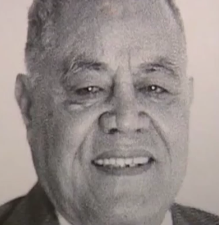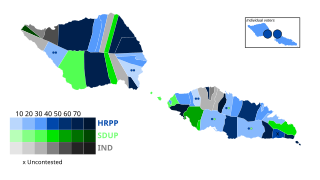
The Human Rights Protection Party is a Samoan political party. It was founded in 1979 and dominated Samoan party politics for decades thereafter, leading every government until their defeat in 2021.

The Samoan National Development Party (SNDP) was a political party in Samoa, and the country's main opposition party between 1988 and 2003.

The Samoan Conservative Progressive Party (SCPP) was a political party in Samoa. The party was established in June 1995 by Leota Itu'au Ale, former deputy leader of the Samoan National Development Party after a disagreement over the party's leadership. The SCPP supported the incumbent Human Rights Protection Party government.

SusugaTuilaʻepa Lupesoliai Neioti Aiono Saʻilele Malielegaoi is a Samoan politician and economist who served as the sixth prime minister of Samoa from 1998 to 2021. Tuilaʻepa is Samoa's longest serving prime minister and was leader of the opposition from 2021 to 2022. Since 1998, he has led the Human Rights Protection Party (HRPP). Tuilaʻepa first entered parliament in 1981 when he won a by-election to represent the electorate of Lepā. He also served as Deputy Prime Minister and Minister of Finance in the government of Prime Minister Tofilau Eti Alesana, and also held the portfolios of Tourism and Trade, Commerce & Industry.
Polataivao Fosi Schmidt (1933–2005) was Samoan politician and a member of the Legislative Assembly of Samoa from 1964-1999. He was a member of the Human Rights Protection Party.
Matatumua Maimoana (1935–2012), also known as Matatumua Maimoaga Vermeulen, was a matai, politician, Nurse and Environmentalist of Samoa. Her chief title, Matatumua, was an orator's title from the village of Faleasiu. She was a former member of parliament in Samoa and the founder of the Samoa All People's Party (SAPP), becoming the first woman to lead a political party in the country. SAPP allowed people as young as 16, regardless of gender or whether they were matai to be officers in the organisation which included village branches. She was a founding member of the Human Rights Protection Party (HRPP), which has dominated Samoan politics in the last two decades.

The prime minister of the Independent State of Samoa is the head of government of Samoa. The prime minister is a member of the Legislative Assembly, and is appointed by the O le Ao o le Malo for a five-year term. Since independence in 1962, a total of seven individuals have served as prime minister. The incumbent was disputed due to the 2021 constitutional crisis, when Tuila'epa Sa'ilele Malielegaoi refused to accept the results of the 2021 general election. On 23 July 2021, the Samoan Court of Appeal ruled that the Faʻatuatua i le Atua Samoa ua Tasi (FAST) party had been in government since 24 May. Tuila'epa then conceded defeat, resulting in FAST party leader Fiamē Naomi Mataʻafa becoming prime minister.

Vaʻai Kolone was the fourth prime minister of Samoa and a founder of the Human Rights Protection Party (HRPP) in Samoa. He served as Prime Minister twice, first between 13 April and 18 September 1982, and then from 30 December 1985 until 8 April 1988.

The Christian Democratic Party (CDP) was a political party in Samoa. The party was founded in February 1985 by the supporters of former Prime Minister Tupuola Taisi Tufuga Efi. At the 1985 election the party won only 15 of 47 seats, but was able to form a coalition government in December 1985 after 11 Human Rights Protection Party MPs crossed the floor to vote against the budget of then-Prime Minister Tofilau Eti Alesana. Va'ai Kolone became Prime Minister. While apparently retaining a majority after the 1988 election, the party lost power after the defection of Tanuvasa Livigisitone to the HRPP.

General elections were held in Samoa on 31 March 2006 to determine the composition of the 14th Parliament. The main contesting parties were that of incumbent Prime Minister Tuilaʻepa Saʻilele Malielegaoi, of the Human Rights Protection Party (HRPP); and the Samoan Democratic United Party (SDUP). In addition, three other parties, the Christian Party (SCP), the Samoa Party (SP), and the Samoa Progressive Party (SPP), competed in the election. The result was a landslide victory for the HRPP, which won 33 of the 49 seats. The newly founded SDUP secured ten seats, and the remaining six were won by independents. After the election, three independents joined the HRPP, increasing the party's seat count to 36.

General elections were held in Samoa on 2 March 2001 to determine the composition of the 13th Parliament. Prime minister Tuilaʻepa Saʻilele Malielegaoi led the Human Rights Protection Party (HRPP) into the election. Opposition leader and former prime minister and future head of state, Tui Ātua Tupua Tamasese Efi led the Samoan National Development Party (SNDP) into the election. The HRPP won 23 seats, but initially fell short of a majority. The SNDP won 13 seats, the Samoan United People's Party secured one seat and the remaining 12 were won by independents. Following the election, all 12 independents joined the HRPP, giving the party a majority in parliament and allowing Tuila'epa to remain prime minister.

The Western Samoa Labour Party (WSLP) was a political party in Samoa. It was founded on June 4, 1993, by To'alepai Toesulusulu Si'ueva, a former Minister of Health in the 1985 - 88 coalition government. The party opposed the HRPP and the 1991 constitutional amendment which saw the term of the Fono extended from three to five years.

The Samoa Liberal Party was a political party in Samoa. It was founded in June 1993 by three MPs expelled from the Human Rights Protection Party for crossing the floor and voting against part of the government's budget. The party's first leader was Nonumalo Leulumoega Sofara.

The Samoan United Independents Political Party (SUIPP) was a political party in Samoa. The party was formed in the wake of the 2001 election, when 12 independent MPs grouped together. The party later combined with the Samoan National Development Party to form the Samoan Democratic United Party.
Le Tagaloa Pita is a high chief matai and a former Member of Parliament of Samoa. He is a matai from the village of Sili on the island of Savai'i and has an honorary doctorate from Drew University in the United States. During his political career, he was a member of the Human Rights Protection Party (HRPP) and a cabinet minister with the portfolios of economic affairs and post office.

General elections were held in Western Samoa on 26 April 1996 to determine the composition of the 12th Parliament. The election occurred following constitutional amendments that extended the parliamentary term from three to five years and increased parliament's seat count from 47 to 49. Five parties contested the election, including the governing Human Rights Protection Party (HRPP), led by Prime Minister Tofilau Eti Alesana and the main opposition, the Samoan National Development Party (SNDP), led by Tui Ātua Tupua Tamasese Efi. The HRPP's popularity suffered a setback due to Chief Auditor Sua Rimoni Ah Chong's 1994 report, which brought to light government corruption. While the SNDP campaigned on anti-corruption, the party's perceived failure to provide checks on the HRPP meant the governing party faced few obstacles to re-election.

General elections were held in Western Samoa on 5 April 1991, to determine the composition of the 11th Parliament. The elections were the first since the introduction of universal suffrage following a referendum held the previous year. However, candidates were still required to be Matai. The two main parties were the governing Human Rights Protection Party (HRPP), led by Prime Minister Tofilau Eti Alesana and the opposition Samoan National Development Party (SNDP), led by former Prime Minister Tupua Tamasese Efi.
Niue Hotel was a hotel in Niue, Oceania, the largest on the island. The government-owned hotel was built in 1975 in the hope of stimulating tourism. It was badly damaged in 1990, but was refurbished and expanded. However, it struggled to attract guests and in 2000 was put up for sale and leased for use as a medical school. The buildings were destroyed by a hurricane in 2004.

Leaupepe Toleafoa Apulu Faafisi is a Samoan politician. He has served as a Cabinet Minister and as Speaker of the Legislative Assembly of Samoa. He is a member of the Human Rights Protection Party (HRPP).
Seumanu Aita Ah Wa was a Samoan politician and former Cabinet Minister. He was a member of the Human Rights Protection Party.







